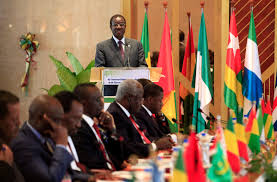Since its establishment in 1975, the Economic Community of West African States (ECOWAS) has remained an institution of regional cooperation, economic integration, and political stability across its member states.
As the institution marks another milestone in its journey, fifty years of service to the citizens of the community it is essential to reflect on its impact achievements and strategic relevance in fostering a united and prosperous West Africa.
One of ECOWAS’ most significant contributions has been in the area of peace and security. With West Africa historically plagued by conflicts, insurgencies, and political instability, the ECOWAS Commission has played a pivotal role in conflict prevention, mediation, and peacekeeping operations.
The establishment of the ECOWAS Standby Force (ESF) and the ECOWAS Early Warning and Response Mechanism (ECOWARN) has helped member states detect and mitigate potential conflicts before they escalate. Notable interventions include peacekeeping efforts in Liberia, Sierra Leone, Mali, and The Gambia, where ECOWAS has successfully mediated political crises and facilitated democratic transitions.
Economic Integration and Trade Facilitation. As part of its core mandate, ECOWAS has made strides in promoting economic integration through initiatives like the ECOWAS Trade Liberalization Scheme (ETLS), which allows the free movement of goods and services among member states. The creation of a common external tariff and the ongoing efforts towards a single currency, the ECO, further highlight ECOWAS’ commitment to economic cohesion.
Additionally, the ECOWAS Common Investment Market has fostered cross-border trade, increased intra-regional investments, and attracted foreign direct investment (FDI) into key sectors such as agriculture, manufacturing, and infrastructure development.
Supporting Vulnerable Communities in times of Crisis.In recent years, the intensification of climate change effects has led to severe floods across parts of West Africa, displacing thousands and endangering livelihoods. Recognizing this emerging challenge, the ECOWAS Commission has expanded its mandate to include targeted support for vulnerable communities affected by floods.
Cooperating with national governments and international partners, ECOWAS has launched emergency response initiatives that provide immediate relief, including food, shelter, and medical assistance. Long-term strategies focusing on climate resilience—such as improved early warning systems, sustainable water management, and community-based adaptation projects—are now an integral part of the Commission’s programming. These interventions are critical in not only saving lives but also in laying the groundwork for recovery and sustainable development in the region.
Empowering Women and Youth. Recognizing the critical role of women and youth in development, ECOWAS has championed gender equality and youth empowerment programs. The ECOWAS Gender and Development Centre (EGDC) has been instrumental in advancing policies that promote women’s economic participation and leadership in governance.
Furthermore, initiatives like the ECOWAS Youth Employment Action Plan (YEAP) and various skill development programs have created opportunities for young people, reducing unemployment and fostering entrepreneurship across the region.
Infrastructural Development and Energy Security. ECOWAS has also made remarkable progress in infrastructure development, particularly in transportation and energy. The West African Power Pool (WAPP) and the ECOWAS Regional Electricity Access Project are key initiatives aimed at addressing energy deficits and ensuring a stable electricity supply across the region.
In transportation, the Abidjan-Lagos Corridor Highway Project stands as a flagship initiative to enhance connectivity, ease trade, and boost regional economic activities. These projects align with ECOWAS’ broader vision of a fully integrated and competitive West African economy.
Adapting to Membership Dynamics: The Cessation of Membership by AES Countries
In the complex landscape of regional politics, membership dynamics within ECOWAS have also evolved. Recently, several AES countries have opted for the cessation of their membership, a decision that has raised both challenges and opportunities for the Commission.
While the departure of these states has temporarily altered the political and economic balance within the bloc, ECOWAS has responded by reaffirming its commitment to regional integration. Strategic consultations and policy adjustments are underway to accommodate these changes, ensuring that the remaining member states continue to benefit from a stable and unified economic space. By addressing the concerns that led to this shift, the Commission is paving the way for a more inclusive and resilient regional framework.
Strategic Relevance in the Face of Emerging Challenges. As West Africa grapples with emerging threats such as terrorism, climate change, and economic shocks, ECOWAS continues to demonstrate its strategic relevance. The Commission’s proactive approach in counterterrorism, disaster management, and economic resilience planning has positioned it as a crucial institution for regional stability.
Despite challenges such as political instability in some member states and delays in implementing key policies, ECOWAS remains steadfast in its mission. Strengthening institutional frameworks, enhancing member-state cooperation, and increasing citizen engagement are essential to ensuring ECOWAS’ continued impact.
The ECOWAS Commission has undeniably played a transformative role in shaping West Africa’s political, economic, and social landscape. From promoting peace and economic integration to supporting vulnerable communities affected by natural disasters and adapting to shifting membership dynamics, ECOWAS stands as a cornerstone of progress for millions in West Africa. As the institution moves forward, reinforcing governance, economic partnerships, and inclusive development will be key to unlocking its full potential.
For ECOWAS, the journey towards a prosperous West Africa is far from over—it is only just beginning.
By Raymond Enoch


Comments are closed.